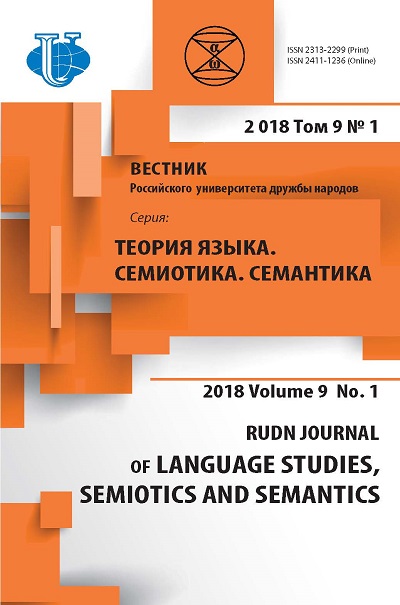Ideologeme the “Slavic community” in the modern political discourse
- Authors: Timofeev S.E.1
-
Affiliations:
- Bryansk State University named after Academician I.G. Petrovsky
- Issue: Vol 9, No 1 (2018)
- Pages: 186-199
- Section: POLITICAL LINGUISTICS. SCIENCE 21.0
- URL: https://journals.rudn.ru/semiotics-semantics/article/view/18276
- DOI: https://doi.org/10.22363/2313-2299-2018-9-1-186-199
- ID: 18276
Cite item
Full Text
Abstract
The article is devoted to the research of ideological concept the slavic community in the modern political discourse. The main approaches in interpretation of the slavic community were considered and analyzed here, as well as the invariants of the ideologeme and constituents of its semantic field by means of the method of the frame knowledge representation with the explication of the semantic field constituents. The subject of the research is the ideological concept of the slavic community . The object is the ideological usage of the concept the slavic community in the modern political discourse. The content of the political character with a keyword the slavic community was selected in the system of the “Russian National Corpus”. The theoretical grounds are based on the conception of the slavic community created by the ideologists S. Gradirovsky, E. Ostrovsky, P. Shedrovitsky. The main methods used in the research were: the method of semantic analysis with a cognitive-semantic description of the word semantics, summary and grouping of statistical observation materials. Such type researches are valuable for the political linguistics. As a result the usage frequency statistics in political discourse of variants of the ideologeme the slavic community was compiled, as well as regularities in usage each of its variants were revealed, and the research results were explained.
About the authors
Sergey Evgenievich Timofeev
Bryansk State University named after Academician I.G. Petrovsky
Author for correspondence.
Email: drumliker@mail.ru
post-graduate student of Bryansk State University named after Academician I.G. Petrovsky, speciality: Linguistic theory; Interests: political linguistics, comparative linguistics, cognitive linguistics, translation theory
Bezitskaya Str., 14, Bryansk, Russia, 241036References
- Arutyunova, N.D. (1999). Language and the world of man. Moscow: Yazyki russkoi kul’tury. (In Russ).
- Batanova, O.N. (2008). The concept of the Russian world: origin and development. Bulletin of the National Institute of Business, issue 6, 83—84. (In Russ).
- Bakhtin, M.M. The word in the novel. In: Questions of literature and aesthetics. Moscow: Fiction. (In Russ).
- Boldyrev, N.N. (2016). Cognitive schemes of language interpretation. Issues of Cognitive Linguistics, 4(49), 10—20. (In Russ).
- Boldyrev, N.N. (2017). Problems of verbal communication in the cognitive context. Issues of Cognitive Linguistics, 2(51), 5—14. (In Russ).
- Vezhbitskaya, A. (1999). Semantic universals and the description of languages. Moscow: Yazyki russkoi kul’tury. (In Russ).
- Vorobyov, V.V. (2008). Linguoculturology. Moscow: RUDN. (In Russ).
- Golovanevsky, A.L. (2001). Ideological concepts in lexicographic discourse: semantics, pragmatics, syntagmatics. In: Principles and methods of philological research: the end of the ХХth century, issue 6, 335—339. Saint Petersburg, Stavropol. (In Russ).
- Gradirovsky, S.N & Mezhuyev, B.V. The Russian world as an object of geocultural design. URL: http://www.archipelag.ru/en_mir/history/histori2003/gradirovsky-russmir (accessed: 20.11.2017).
- Zhukotskaya, A.V. The phenomenon of ideology. URL: http://service.ebooksearch.webfactional. com/en (accessed: 12.11.2017).
- Zhuravlev, S.A (2004). Ideologems and their actualization in the Russian lexicographic discourse [abstract of dissertation]. Kazan. (In Russ).
- Karasik, V.I. (1996). Cultural dominants in the language. In: Linguistic personality: cultural concepts. Volgograd, Arkhangelsk: The Peremena. (In Russ).
- Kupina, N.A. (2000). Language construction: from the ideological system to the system of culture. Russian language today, Issue 1. (In Russ).
- Klushina, N.I. (2014). Theory of Ideology. Political Linguistics 4(50), 54—58. (In Russ).
- Krivopuskov, V.V. (2016). Concept “russian world”: principles and possibilities of methodological approaches, The Bulletin of Adyghe State University, Issue 1(174), 111—119. Rostov-on-Don. (In Russ).
- Likhachev, D.S. (1993). Concept of the Russian language. Izvestia RAN, Series of Literature and Language, 1(52), 3—9. (In Russ).
- Malysheva, E.G. (2009). Ideologem as a linguistic-cognitive phenomenon: definition and classification. Political linguistics, 4, 32—40. (In Russ).
- “News of the Russian World”. URL: http://webnovosti.info (accessed: 10.15.2017).
- Ostrovsky, E. New borders of the world: geoculture. URL: http://gtmarket.ru/laboratory/ publicdoc/2006/472 (accessed: 20.11. 2017).
- Piontek, B.M. (2012). General language factors of genesis ideologeme as a category of political linguistics (on the material of Polish and Russian languages) [abstract of dissertation]. Moscow. (In Russ).
- Shchedrovitsky, P.G. The Russian world. Possible goals of self-determination. URL: http://www.archipelag.ru/authors/shedrovicky_petr/? Library = 2015 (accessed: 20.11.2017).
- Starodubets, S.N (2017). Appraisal and connotation “spirituality” in the discourse I.A. Ilyin. Izvestiya Smolenskogo gosudarstvennogo universiteta, 3(39), 36—37. (In Russ).
- Starodubets, S.N. (2010). Specificity of the organization of language symbolic means in the discourse I.A. Ilyin [dissertation]. Bryansk. (In Russ).
- Chudinov, A.P. (2006). Political Linguistics. Moscow: Flinta: Nauka.
- Deik, T.A. van (1989). Language. Cognition. Communication. Moscow: Progress.
- James, P.G. (2008). Social Linguistics and Literacies: Ideology in Discourses. Taylor and Francis.
Supplementary files












